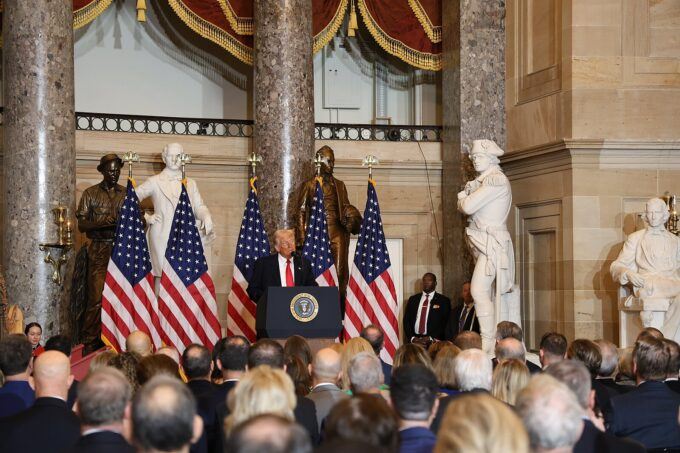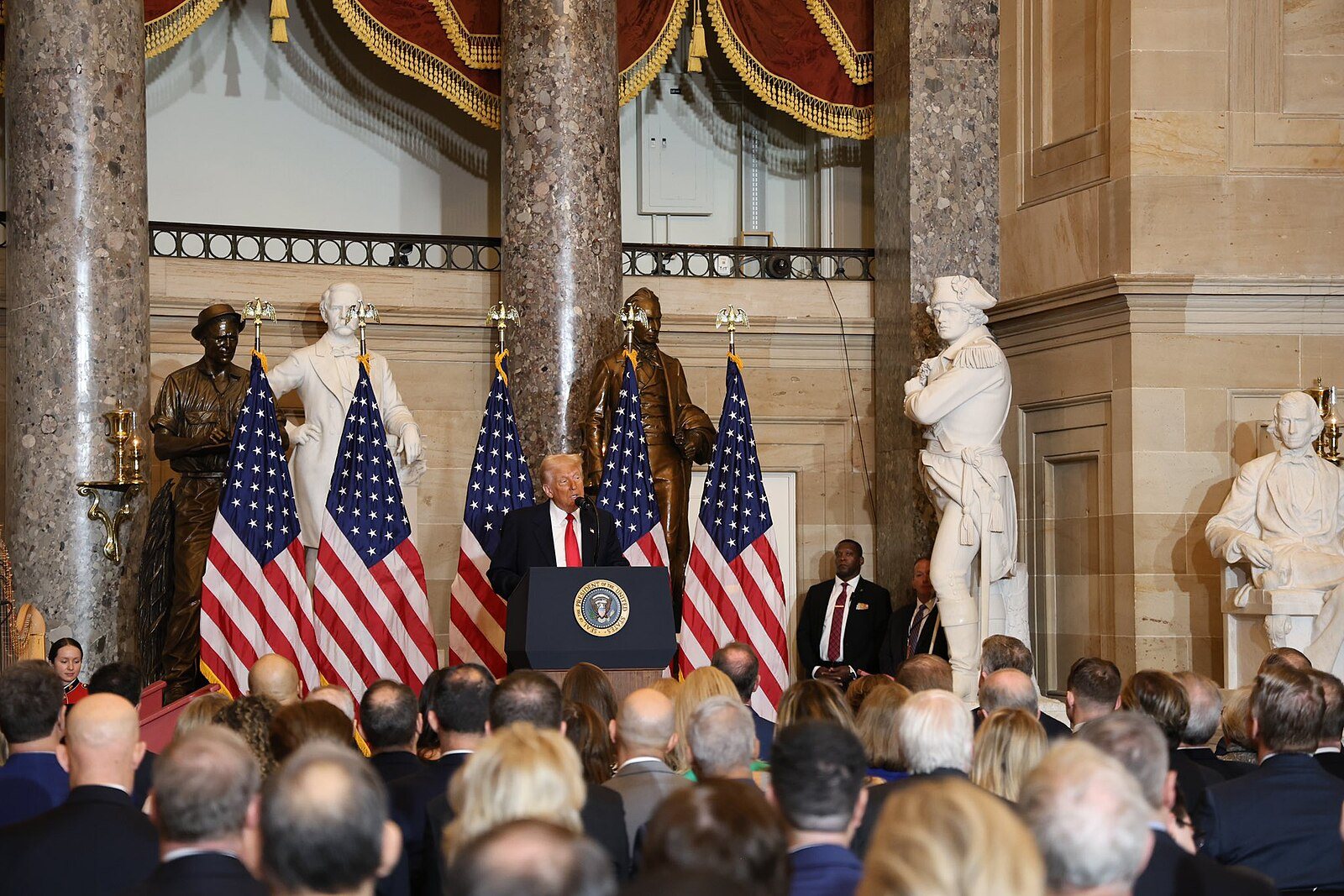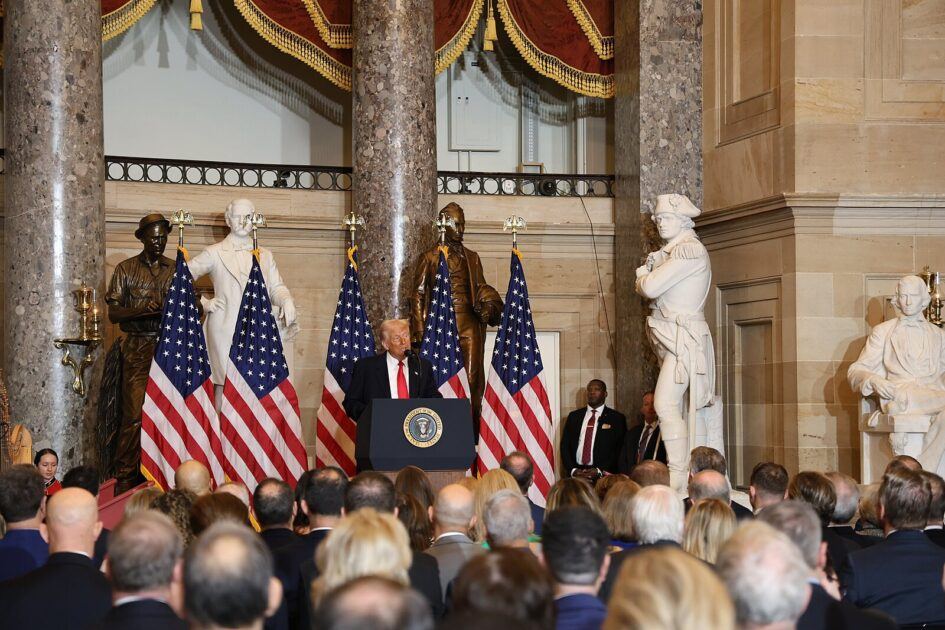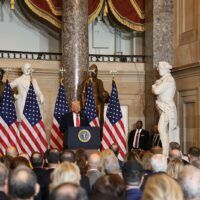


































































Photograph Source: Office of Speaker Mike Johnson – Public Domain
Donald Trump made it clear in the 2016 presidential debates that he had no understanding of the central issues of the nuclear arms race, particularly the role of the nuclear triad. When Trump couldn’t answer a question on nuclear verification, he predictably responded that “it would take me an hour and a half to learn everything there is to know about missiles. I think I know most of it anyway,”
The Pentagon’s Joint Chiefs of Staff were so alarmed by Trump’s nuclear ignorance that they held a seminar to brief the president on the nuclear inventory in 2017. Following the meeting, responding to Trump’s demand for increasing the size of the nuclear inventory tenfold, Secretary of State Rex Tillerson referred to Trump as a “fucking moron.”
In his second term, Trump has deployed a new weapon, which is the censoring of sensitive documents that reveal the danger of an accidental launch of nuclear weapons and the problems associated with nuclear exercises. In an unprecedented act, the Department of State has removed from its website a 15-page document dealing with a 1983 NATO nuclear exercise that produced a “war scare” in the Kremlin. The document was withdrawn from the department’s series on the “Foreign Relations of the United States,” which contains over 400 volumes.
When Trump began his second term, he fired the nine nonpartisan members of the Historical Advisory Committee, who presumably would have stood in the way of this unusual censorship. The censored document dealt with U.S. naval exercises that “simulated surprise naval air attacks on Soviet targets.” Soviet and Russian officials over the years have assumed that such exercises would be used to conceal an actual U.S. attack against Russia, which is why any evidence of a sophisticated strategic exercise would raise alarm bells in the Kremlin.
I was one of several Soviet analysts at the CIA in 1983 who convinced CIA director William Casey that the Soviet “war scare” was genuine and that President Reagan needed to be informed, Casey was hesitant at first and his deputy, Robert Gates, was downright dismissive of our analysis. Fortunately this was one of the few times that Casey ignored Gates and followed the lead of his Soviet analysts. As a result, President Reagan withdrew from participation in the exercise and the overall exercise was toned down and made less threatening. This opened the door to the Reagan-Gorbachev summits in the 1980s that produced major success in the field of arms control and disarmament. (CIA analysts had the advantage of a Soviet agent, Oleg Grinevsky, who provided credibility to the argument that the war scare in the Kremlin was genuine.)
The White House and the Pentagon presumably withdrew the document from the historical record because it explores the danger of possible misuse of nuclear weapons and the added danger of the failure to conduct a strategic dialogue. Similarly, the Pentagon currently is waging a propaganda war against the important film, “House of Dynamite,” because it exploits the dangers of an accidental launch and the ineffectiveness of national missile defense. (I co-authored a book, “Phantom Defense,” nearly 30 years ago that documented the failures and waste associated with national missile defense.)
The Trump national security team cannot even claim to have a serious expert on arms control and disarmament at a time when there are compelling reasons for a high-level Russian-American dialogue to reduce nuclear weapons, to restrict military exercises, and to avoid any return to nuclear testing. The Russians have called for such a dialogue; the United States has not yet responded.
The Cuban missile crisis should have taught us lessons in support of bilateral negotiations in times of tension as well as the need to bring China into the strategic dialogue. Shouldn’t we assume that Russian and Chinese leaders who face U.S. military encirclement and aggressive military exercises could overreact to the actions and policies of their major adversary?
The post Trump Adds Censorship to the Campaign Against Arms Control and Disarmament appeared first on CounterPunch.org.
This post was originally published on CounterPunch.org.